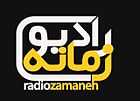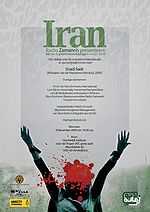Radio Zamaneh
 | |
| Type | Public radio network |
|---|---|
| Country | The Netherlands |
| First air date | August 2006 |
| Availability | Global |
| Founded |
2005 by The Radio Zamaneh Foundation, Free Press Unlimited, The Netherlands Foreign Ministry |
| Headquarters | Amsterdam, NH |
| Broadcast area | Iran, International |
| Owner | Radio Zamaneh Foundation |
| Key people |
Mohammad-Reza Nikfar, Editor-in-chief Arjen de Wolff, executive director Pejman Akbarzadeh, senior producer |
| Established | 2006 |
| Launch date | August 2006 |
| Official website | |
| Language | Persian & English |

Radio Zamaneh (Persian: رادیو زمانه) is an Amsterdam-based Persian language radio. "Zamaneh" is the Persian literary term for "time".
Radio Zamaneh is an independent Persian-language broadcaster that was founded in 2005, after the parliament of The Netherlands passed a resolution calling for support to free Iranian media. Radio Zamaneh is the recipient of various Human Rights and Press Freedom grants, with the Dutch Ministry of Foreign Affairs and the European Union being amongst the major contributors. The broadcaster's content is provided by Radio Zamaneh's Persian-speaking, almost all Iranian editorial staff and contributors. Radio Zamaneh is an independent broadcasting organization, registered as a non-profit organization in the Netherlands, with its headquarters and studio in Amsterdam.
Radio Zamaneh broadcasts in Persian via satellite and the internet. The programs contain general news and bulletins, philosophical, social and cultural topics and issues, with special attention for free thought, critical thinking, arts and culture, women's rights, LGBT and minorities. Radio Zamaneh is an alternative voice in the foreign-based Iranian media-landscape, focusing on taboo and using humor and satire as a frequent tool.
Radio Zamaneh develops and provides e-learning on various topics related to journalism, democracy and human rights, and international relations, in Persian, to an Iran-based audience.
The broadcaster produces and supports documentary films. Two new documentaries, one torture-victims and one on the position of LGBTI-individuals in Iran, are set to be released in 2013.
Radio Zamaneh is engaged in advocacy for Iranian media development and to promote access to information for Iranians by speaking out and actively countering satellite jamming and online censorship.
Currently, Radio Zamaneh operates a 24-hour radio channel, a Persian-language news and current affairs website, an English-language summary website, a secure e-learning environent and Tribune Zamaneh, a platform for citizen reporters and e-learning journalism students.
Radio Zamaneh was among a list of foreign organizations, including media outlets and human rights groups, which Iran’s Intelligence Ministry placed on a blacklist over their alleged role in fomenting the unrest that followed the disputed presidential election in June 2009.

Mehdi Jami was the director of Radio Zamaneh from the beginning until October 2008. Persian-born Dutch politician and MP, Farah Karimi, was among the founding members of the media. After Jami, from November 2008 until July 2009, Zoran Djukanovic, who is program coordinator of Radio Zamaneh at Press Now, was the Interim Director, with Hossein Alavi as Interim Editor-in-Chief. In July 2009, Farid Haerinejad and Ruth Kronenburg joined Radio Zamaneh as the new Editor-in-Chief and Director of the organization. Since January 2011, Arjen de Wolff is the executive director. Mohamad-Reza Nikfar is Radio Zamaneh's chief-editor.
Aims

The aim of Radio Zamaneh, according to its administrators, is "to produce and broadcast informative programs of high journalistic quality, independent from any governmental, political, or social forces inside or outside of Iran".
In its press release, Radio Zamaneh announced that "[it] intends to increase and intensify working relations with online bloggers. The Iranian blog sphere is representing one of the largest web communities in the world. They are considered the preserve of young urban Iranians both inside and outside the country. Their voices are not heard by the mainstream media, neither in Iran itself nor in West-based Iranian media. Radio Zamaneh will serve as a platform for Iranian bloggers and reflect their grassroots opinions and views."
History
In 2003, the Dutch parliament planned to establish a Persian-language television station in the Netherlands, but after negative reactions from the Iranian government, the project was halted. Proposals were put forward for promoting independent journalism in Iran and eventually the budget was divided between a number of projects, with Radio Zamaneh and Shahrzad News receiving the bulk of the funding.
In 2006, after three years of negotiations[citation needed], the Radio Zamaneh board selected London-based Persian journalist and radio producer Mehdi Jami as the director of Radio Zamaneh. Jami moved to Amsterdam, where he held a workshop to initiate Radio Zamaneh's activities inviting more than 30 Iranian writers, journalists and bloggers from San Francisco, Washington D.C., Toronto, London, Paris, Berlin, Cologne, Prague and Tehran. Shahrokh Golestan, Abbas Maroufi, Mohammad-Reza Nikfar, Jamshid Barzegar, Nikahang Kowsar and Behzad Bolour were among them. After a 5-day workshop, Radio Zamaneh released a statement calling itself the "Voice of Persian Bloggers"[citation needed].
Beginning
Internet broadcasting started on 4 August 2006 while satellite broadcasting started on 7 September. Short-wave broadcasting started in September 2006 and stopped in January 2008.
A few days before starting the programs, Radio Zamaneh broadcast Iranian underground music. This act was warmly received by underground musicians in Tehran, but also criticized by many in the target audience because of the harsh language used in many of the songs. RZ gradually divided its musical broadcasts into "Persian Classical", "Persian Symphonic", "Persian Folk", "New Voices", "Western Classical", "Film Music" and "World Music"[citation needed].
Broadcasts
Radio Zamaneh broadcasts 24 hours on its satellite channel. The daily programs are also available online on Radio Zamaneh's website. The core of its current affairs and cultural, social and economic program is broadcast 1.5 hours a day through internet and satellite. Daily broadcasts start at 18:00 Amsterdam time (20:30 Tehran time) and will be repeated 4 times.
Hacking and other cyber attacks
In January 2010, hackers calling themselves the Iranian Cyber Army hijacked the website of Radio Zamaneh, several weeks after doing the same to China's Baidu Inc search engine and Twitter.
According to Reuters: "Since early Saturday [30th January 2010], visitors to the website of Dutch government-funded Radio Zamaneh, which reports on human rights and unrest in Iran, have seen the message "this web site has been hacked by Iranian Cyber Army" followed by a warning in Persian: "Iranian Cyber Army warns all treasonous mercenaries that it will not leave them at peace even in the bosom of their masters.[1]"
The problem was solved after three days.
Attempts to hack and Ddos-attack Radio Zamaneh's websites and systems have since remained frequent, with a sharp increase of malicious activity since early 2012.
Organizing and support

Since 2006 to 2010 Radio Zamaneh has supported various cultural and human rights projects such as Iranian underground music Festival in Zaandam (2006),[2] Tehran section of Rotterdam Film Festival in Rotterdam (2007), Noor Film Festival (2008), The documentary "Hayedeh: Legendary Persian Diva" (2009)[citation needed], European tour of Kiosk Band (2010)[citation needed], etc.
In December 2009 Radio Zamaneh organized a conference about "Human Rights and Press Freedom in Iran" at Amsterdam's Tropical Theatre. The women rights activist Shadi Sadr gave a lecture in this conference.[citation needed]
In November 2012, Radio Zamaneh hosted a conference in Amsterdam on the future role of media and online activism in Iran. Nobel Prize Laureate Shirin Ebadi was one of the keynote-speakers.
Criticism
In 2008, the radio was criticized by exiled political activists because of its supposed conservative policies. Their opinions were published in Dutch daily newspaper De Volkskrant, in an article entitled "Here is Radio Tehran".In July 2012, one-hundred Dutch citizens of Persian origin sent an open letter to the Dutch Ministry of Foreign Affairs, criticizing the current director, Arjen de Wolff, because of creating an atmosphere which caused the resign of Farid Haerinejad (editor-in-chief) and some other members of the editorial team. De Wollf was also criticized for his presence in a meeting held by a separatist Azari group. [3]
References
External links
- Radio Zamaneh main website (in Persian)
- Tribune Zamaneh (citizen reporting website)
- Radio Zamaneh (English section)
- Dutch national broadcasting network news NOS on Radio Zamaneh's work
- Nobel Prize Laureate Dr. Shirin Ebadi speaking at Radio Zamaneh debate, november 2012
- Persian radio in Holland gives Iranians news (AP)
- The editor-in-chief, Farid Haerinejad: Zamaneh, Yesterday, Zamaneh, Tomorrow
- Radio Tehran - Volkskrant article in Dutch language
- Press Now Statement about Radio Zamaneh
- Speech on openings party Radio Zamaneh from director Mehdi Jami
- Dutch-Persians' open letter against Arjen de Wolff, "director of Radio Zamaneh"
